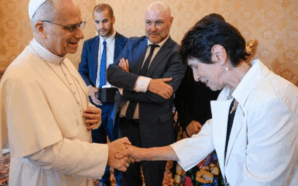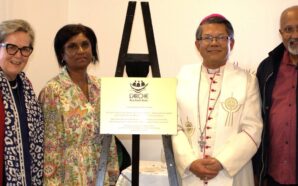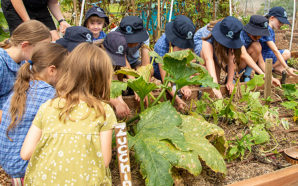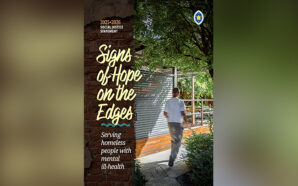On 30 July, Mauricio López Oropeza, one of Latin America’s most influential lay leaders, was invited to speak as part of the Hélder Câmara lecture series at Newman College, Melbourne.
This is a copy of his address.
As well as being one of the leaders of the Amazon Synod, Mauricio is the lay Vice-President of the Ecclesial Conference of the Amazon, which is responsible for implementing the outcomes of the Synod. He was also a former member of the Dicastery for Promoting Integral Human Development, member of the facilitation team for the Synod on Synodality and founding director of the Amazon University Program.
Yesterday as I walked through the First Peoples exhibition at the Melbourne Museum, I felt a deep sense of reverence and discomfort. This space holds the voices of some of the world’s oldest living cultures, whose wisdom and connection to land have endured for thousands of years. It also reveals the painful truth of encounter which I experienced so deeply as I heard and saw the testimonies: not of harmony, but of rupture and loss. Yet, what moved me most was the strength in the hopeful stories shared through deep listening. Elders and young people speaking not just of survival, but of cultural pride, memory, and future. In that space, I sensed and confirmed what the Church is called to become: a community that truly listens, that walks alongside, that acknowledges wounds without rushing to fix them, and that honors every culture as a gift. This is the heart of the synodal path, a journey of humility and encounter.
The voices I heard in the First Peoples exhibition brought me back to so many moments shared with communities in the Amazon, with stories marked by depth, beauty, resistance, and pain. As I listened here in Australia, I felt once again that the synodal path is not something abstract. It is about walking with respect, in the rhythm of the canoe, inhabiting the tensions, with an open heart. Australia has offered me a testimony that is beautiful and unfinished, where deep wounds co-exist with the courage to build new relationships.

Mauricio Lopez speaks as part of the Hélder Câmara Lecture series in Melbourne in July 2025. Image: parallaxmedia/Diocese of Parramatta
In the Migration Museum, I stood in front of stories of those who left everything behind in search of a place to belong. It helped me understand that synodality is also about this: holding together the memory of pain and the desire to build something more human in a broken world where war, rupture and genocide continue to exist.
Here’s a prayer which expresses the definition of synodality; it is not about mechanical procedures or fulfilling protocols, but about conversion:
“For (those participating in the Synodal journey), we ask the Holy Spirit first of all for the gift of listening: to listen to God, that with him we may hear the cry of the people; to listen to the people until breathing in the desire to which God calls us” (Episcopalis Communio).
1. Listening is a gift, a God-given grace; 2. Listening is not an autonomous exercise. It is a process to recognise God at the center and recognising we are co-creators of the Kingdom. 3. And a call to recognise the Sensus Fidei through the concrete lives of the people, where we are to discover and discern, as community, God´s will.
As I walk with the peoples of the Amazon, I carry the memory of a living, sacred territory – wounded, yet full of life. The Amazon is far more than forests and rivers. It is a biome that breathes through its rich biodiversity, its cultural depth, and the voices of hundreds of Indigenous nations. Often misrepresented as “empty,” it is home to over 43 million people—around 3 million of whom belong to Indigenous and traditional communities. Nearly 400 distinct nations speak more than 240 languages. Around 100 voluntarily isolated groups preserve, in silence, the mystery and dignity of life.
This territory sustains the planet in so many ways. One third of the world’s biodiversity and primary forests are found here. It produces 20% of the Earth’s non-frozen fresh water – one in every five glasses of water we drink. The Amazon remains a vital lung of the Earth as expressed by Pope Francis’ Laudato Si´. Yet today, this living system is in crisis and under threat. 17% of the primary forest is already lost. If we reach 25%, we will cross a point of no return, and the Amazon will become a savannah – disrupting global climate and extinguishing cultures and ecosystems.
This collapse is driven by a devouring model of development that sees the Amazon as an endless reserve for extraction. Monocultures, large-scale cattle ranching, oil and mineral exploitation, and biopiracy are destroying lives and lands. This brings with it forced displacement, criminalisation, and the assassination of Indigenous leaders. The Amazon is bleeding – ecologically, culturally, spiritually.
And still, from within this pain, hope emerges. The Church, after asking forgiveness for its role in colonisation, now recognises the Amazon as a locus theologicus – a sacred place where God speaks through creation and peoples. Pope Francis’ call for the Synod on the Amazon was not only for the region, but for the whole Church. It marked a turning point: listening to the peripheries to discern new paths for the Church and for integral ecology.
The synodal process was historic. Over 87,000 people, including many Indigenous communities, participated. This collective discernment shaped the Church in new ways and anticipated the Synod on Synodality – echoing Australia’s own Plenary Council. From the margins, the Church is being renewed.
This journey continues. Structures like the Ecclesial Conference of the Amazon are living signs of this new path. I serve as one of its vice presidents as a layperson, alongside two Indigenous women, a priest, and a Cardinal serving as its president. CEAMA opens new possibilities for leadership, governance, and interculturality. We are also walking toward an Amazonian rite, and reimagining ministry from an intercultural approach.

Mauricio Lopez (left) with moderator Geraldine Doogue as part of the Hélder Câmara Lecture series in Melbourne in July 2025. Image: parallaxmedia/Diocese of Parramatta
Also, I was given the “crazy” task of leading to process to build the Amazon University Program. It brings intercultural, accredited higher education directly to communities – through local facilitators and hybrid learning. It responds to over a decade of listening, and creates real access without uprooting people from their land. This is not just education – it’s about dignity. It’s a potential path of encounter, co-creation, and hope.
As I stand here – on the eve of St Ignatius’ feast, within Newman College – I carry two deep anchors: Newman’s vision of education as a search for truth with integrity, and Ignatius’ incarnational spirituality that finds God in history, territory, and encounter. I’m Catholic, but with an Ignatian GPS that – like all tech – at times fails or needs recalibrating. PUAM is our humble effort to walk with Amazon communities, listening and learning across cultures. We know we have a major challenge in front of us, but we come seeking companions, shared wisdom, support and continued exchange – because unity in diversity is not a slogan, it’s our only real hope as Australia continues to show us.
A final extract from James McAuley:
Incarnate Word, in whom all nature lives. Cast flame upon the earth. Set pools of silence in this thirsty land… Undo the nets of past and future. Make A venture of our lives. Abandon to the lake Our boats, our nets, our all — that we may dream of drowning, and arise to a new stream.
Read more about Mauricio’s presentation in Melbourne here.
Re-watch Mauricio’s presentation during the Bishop Vincent Presents lecture series in the Diocese of Parramatta on YouTube here.









